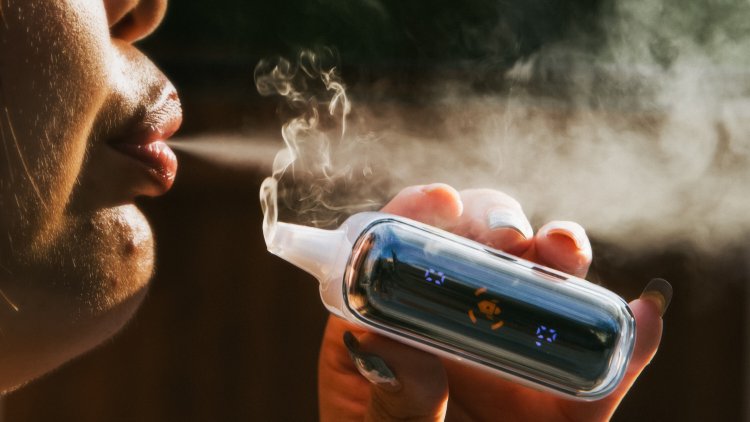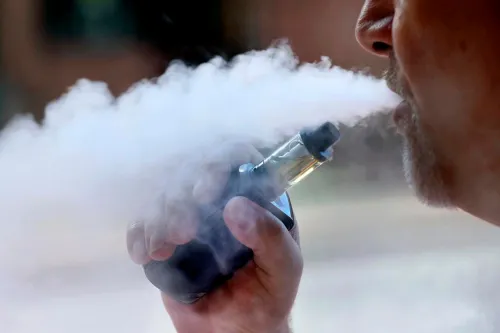Is Vaping a Real Aid in Quitting Smoking? The Untidy, Shadowy Reality of the Trend
The guy in the car next to you at a red light, your barista, and the person speeding past you on the sidewalk seem to be vaping these days, with clouds following them like a personal fog machine. It is more than a fleeting phase. Once a fringe smoking cessation method, vaping has grown into a major cultural phenomenon. roughly 15 million people, or roughly 6% of American adults, currently report regularly vaping; in the last three years, this number has doubled.

Given that smoking has a well-established reputation for being fatal—cancer, heart disease, emphysema, etc.—many people are wondering if vaping is a safer alternative to quitting cigarettes. It turns out that the answer is not at all straightforward.
An Unexpected Action by the FDA
The R.J. Reynolds Vapor Company recently made headlines when the FDA approved marketing and sales of its tobacco-flavored Vuse Solo e-cigarette cartridge. The government has already rejected over a million flavored vape items from other firms, and at the same time, it rejected ten more flavored products from the same company.
However, it should be made clear that the FDA is not endorsing these goods. The fact that authorization is conditional was actually stressed. The approval might be revoked if R.J. Reynolds targets youth with its marketing, or if adolescent or non-smoker use increases. Indeed, the business is required by law to monitor precisely who is utilizing its products.
So why even give the go-ahead?
Because vaping may aid adult smokers in quitting, according to the FDA, which could benefit public health overall.
Does Vaping Actually Aid in Quitting Smoking?
The science behind this is still developing, and to be honest, it is not very clear. According to some research, vaping may assist smokers to stop smoking to a moderate extent. According to a comprehensive analysis of 61 studies, 9 to 14 out of 100 vapers who attempted to stop were successful. It is not a miracle, but it is better than the 4–7 out of 100 people who give up using counseling or nicotine patches alone.
According to a different study, vaping helped participants reduce their daily cigarette consumption, at least over a six-month period, even if they did not completely stop.
However, there is a lot of ambiguity in these statistics. Additionally, gray regions are often cause for concern in the field of public health.
Is Vaping a Safer Alternative to Smoking?
The truth is that vaping is not safe, even if it is likely less dangerous than smoking. By no means.
Let us dissect it:
Addiction to nicotine is a major concern. When you smoke a cigarette or use a vape, you are inhaling a highly addictive combination of substances. Actually, compared to cigarettes, many vapes provide more nicotine. Nausea, high blood pressure, and even digestive problems are examples of side effects.
Your heart and lungs dislike it. Chemical irritants, carcinogens, and hazardous metals can all be found in vape aerosols. Research has connected vaping to an elevated risk of heart attack, emphysema, and chronic bronchitis.
Do you recall EVALI? Hospitals witnessed a startling increase in serious lung ailments linked to vaping back in 2019, especially with THC vapes that contained vitamin E acetate. EVALI caused 68 fatalities and more than 2,800 hospitalizations. It is odd that the FDA did not even bring up the fact that instances have drastically decreased in their most recent announcement.
The hazards of pregnancy are genuine. Nicotine can impair the development of the embryonic brain and lungs. Unknown flavorings are added, and the result is a concoction that no doctor would suggest.
It is a Different Beast for Children and Teens
Teenagers have an easy choice: do not vape, but adults may have a complicated cost-benefit analysis to make.
Why?
Nicotine disrupts learning, attention, and emotional control by taking over the developing brain.
Because their bodies are smaller and their organ systems are still developing, children absorb more toxins.
Teens that vape have a higher chance of starting to smoke in the future. That is not advancement. That is regression disguised as something sweet.
Teen vaping is still very common even though regulations prohibit sales to minors. Flavored goods like berry, mango, or bubblegum are used by up to 85% of high school vapers; these flavors are obviously intended to attract younger consumers.
Conclusion: Is Vaping a Good Way to Stop Smoking?
The advice is straightforward if you do not smoke: Do not start. Not with cigarettes. Not with vaporizers. Not with nicotine-delivery devices.
However, there are a few things to keep in mind if you are trying to stop smoking.
It carries some danger.
The long-term effects are unknown at this time.
Instead of only changing how you get nicotine, you should try to completely stop using it.
The FDA's restricted permission is a calculated risk that aims to shift the balance in favor of damage reduction without creating a new public health emergency. It remains to be seen if it succeeds.
What's Your Reaction?





















